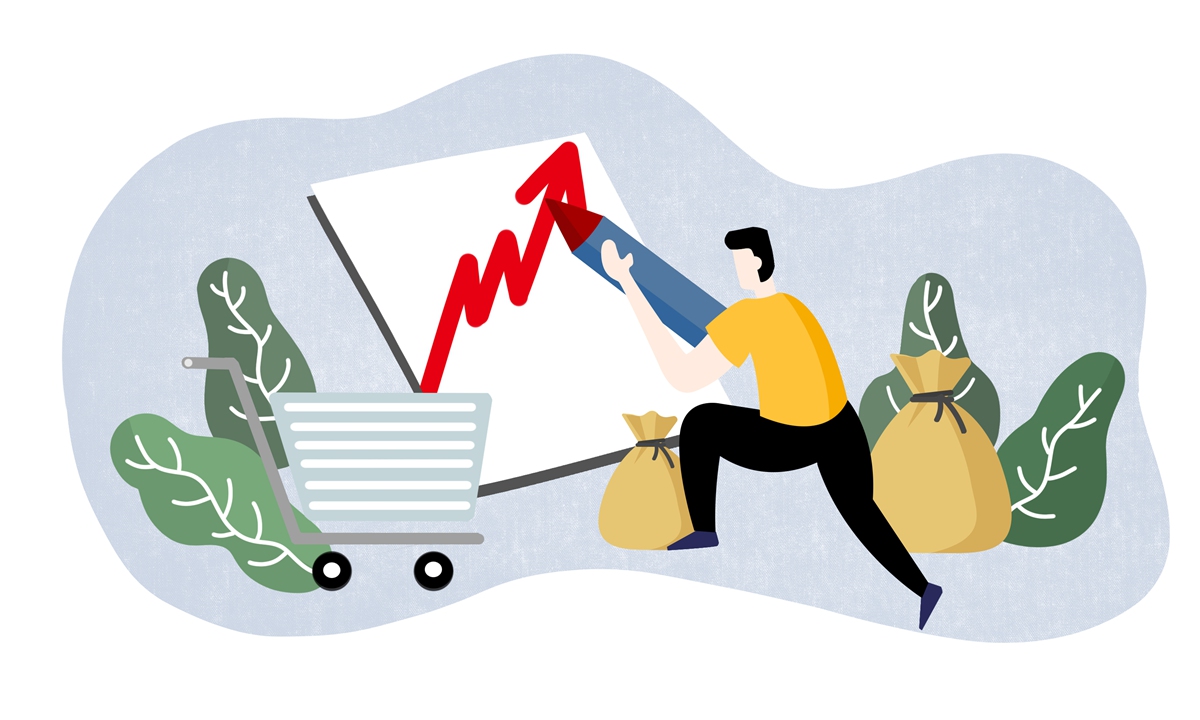COMMENTS / EXPERT ASSESSMENT
China’s structural overhaul to usher in era of solid economic growth

Illustration: Chen Xia/Global Times
The US economy slowed sharply in the third quarter, growing at an annualized rate of 2 percent, lower than China's 4.9 percent growth for the corresponding period. For the whole year, the gap between the world's two largest economies is expected to be further narrowed, as China's yearly growth rate will likely reach 8 percent, doubling the speed of the US' GDP growth.As always, policy makers in Beijing will continue to focus on developing the "dual engines" of consumption and investment to drive domestic demand, in addition to vigorously expanding its exports. Barring any unexpected mishaps or natural catastrophes, China is well positioned to achieve around 5 percent annual growth in the coming years.
And, as a rising economic powerhouse, China will continue to provide abundant and lucrative opportunities for the world's other economies that are willing to actively engage with the "Middle Kingdom".
Asked why she has insisted on pivoting to a closer economic and political relationship with China, outgoing German Chancellor Angela Merkel told German media last week that, when she was elected as German leader in 2005, China's GDP was only $2.8 trillion -- less than Germany's then $3.2 trillion. Nevertheless, Merkel had the rare foresight to know that China will develop very fast, like a galloping horse.
Now, when Merkel is leaving office and set to retire, China's economy in 2021 is nearing $16 trillion. Merkel said that maintaining closer trade and economic links with a skyrocketing colossal economy like China's has significantly helped Germany and Europe, enabling the German people to live a fairly affluent life during the past 16 years of her rule.
Merkel is a visionary leader of the world. During her long tenure, she displayed great interest in China, visited many Chinese cities, big or small, fairly developed or under-developed, saw with her own eyes China's sprawling urbanization process, the government's strenuous anti-poverty efforts, the operation of Chinese enterprises and innovation labs, diligence and cohesion of Chinese workers, which enabled her to know the untapped strength of the economy.
However, many politicians in the West are skittish and nervous of China's rapid progress over a short space of time, while a host of American media commentators keep pouring cold water on China's future growth. In their eyes, China's development is not sustainable, and some, again, predicted that Chinese economy will crash or even collapse.
China's economic performance over the past 40 years has consistently proved them wrong. Actually, China's economy is in better shape than the US', which is facing a protracted Delta variant onslaught, seriously snarled supply chains, faltering consumption and rising inflationary pressure. The combination of slower growth and faster inflation is causing headaches for the Federal Reserve, because if the US central bank is forced to raise rates to curb inflation, the fragile American economy will be further knocked off course.
In comparison, China's economy is currently shifting its gear to make the transition to high-equality growth that pivots to creating market demand for new technologies while harnessing the massive spending power of Chinese consumers. And, the country is taking the initiative to drive the transition and change.
As devised by the policy makers, starting this year - the first year of the 14th Five-Year Plan, a series of macro-control mandates have been issued to regulate the real estate, the private educational tutoring, and the internet-based giant platform companies like Alibaba, Ant, Didi, Tencent and Meituan, which have leveraged their technologies and market scale to engage in monopolistic moves to stifle competition.
Chinese government knows that, for many years, the elevated price of urban homes and children's education have been "two mountains" towering over 500 million middle class citizens which seriously inhibited their spending power. This year, the central government ordered elimination of private tutoring businesses so that average urban families could save $500 per month.
China has formulated a broad policy tools to cut bank lending to real estate developers, and implement a pilot program of levying property tax to stop property investors and speculators from hoarding properties - a move that will play a central role in bringing down runaway housing costs. It is estimated that housing prices in China's first- and second-tier cities will fall by 10-20 percent in the coming five years.
Affordable education and homes will greatly relieve Chinese families of financial burden, and together with constantly growing wages, set a solid basis for boosting domestic consumption. China is poised to become the world's largest consumer market once the 14th Five-Year Plan is fully implemented, with the middle class taking the spending lead. In the third quarter this year, consumption contributed 64 percent to China's economic growth, which will be raised to more than 70 percent by 2025.
Once again, China's unique system of centralized governance will play a decisive role in the economic structural overhaul. The reform may impact property development and economic growth in the short run, as evidenced by the slower growth rate of 4.9 percent in the third quarter, but in the long run, will significantly improve the foundation of Chinese economy and sustain a relatively higher growth rate.
Looking to the other side of the Pacific Ocean, US President Joe Biden's $3.5 trillion fiscal spending bill remains fiercely contested on Capitol Hill with the year drawing to its end. The systemic bureaucracy and partisan backbiting in Washington have made economic legislation perilously slow. To make things worse, America's wealth is increasingly being funneled into Big Tech and Wall Street - isolating large parts of the workforce toiling in other sectors and making their lives more difficult.
The author is an editor with the Global Times. bizopinion@globaltimes.com.cn
